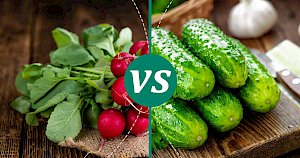Cucumber vs Radish: Make Healthy Choices
Where is more calories, protein, carbs - what is more healthy?


Radish vs Cucumber: Nutrition Comparison
| per 100g | Cucumber | Radish |
|---|---|---|
| Calories | 15 | 16 |
| Carbohydrates | 3.63 g | 3.4 g |
| Fat | 0.11 g | 0.1 g |
| Dietary fiber | 0.5 g | 1.6 g |
| Protein | 0.65 g | 0.68 g |
| Calcium | 16 mg | 25 mg |
| Iron | 0.28 mg | 0.34 mg |
| Magnessium | 13 mg | 10 mg |
| Potassium | 147 mg | 233 mg |
| Sodium | 2 mg | 39 mg |
| Zink | 0.2 mg | 0.28 mg |
| Vitaminium B2 (riboflavin) | 0.033 mg | 0.039 mg |
| Vitaminium B3 (Niacin) | 0.098 mg | 0.254 mg |
| Vitaminium B6 | 0.04 mg | 0.071 mg |
| Vitaminium B9 (Folic acid) | 7 mg | 25 mg |
| Vitaminium C | 2.8 mg | 14.8 mg |
| Vitaminium K | 16.4 mg | 1.3 mg |
Less Calories in Cucumber
At first glance, you can see that in cucumber is just a little less calories than in radish.
Cucumber has 15 kcal per 100g and radish 16 kcal per 100g so it is pretty easy to calculate that the difference is about 7%.
In cucumber and in radish most calories came from carbs.
See tables below to compare cucumber with radish in details.
Cucumber And Radish Nutrition Difference
- Calories:
radish - 7% more than cucumber - Carbohydrates:
cucumber - 7% more than radish - Fat:
cucumber - 10% more than radish - Dietary fiber:
radish - 220% more than cucumber - Protein:
radish - 5% more than cucumber
Less protein in cucumber
It is aslo easy to see see that in cucumber is less protein than in radish.
There is 0.68g per 100g of radish and 0.65g per 100g of cucumber so using simple math we can see that difference is about 5%.
More carbohydrates in cucumber
In cucumber is more carbohydrates than in radish.
There is 3.4g/100g of carbohydrates in radish and 3.63g/100g in cucumber so let me do the math for you again - difference is about 7%.
More fat in cucumber
In cucumber is more fats than in radish.
The tables above show us that there is 0.1g/100g of fats in radish and 0.11g/100g in cucumber. In this case difference is about 10%.
Cucumber
15kcal- Calories15
- Carbohydrates3.63 g
- Fat0.11 g
- Dietary fiber0.5 g
- Protein0.65 g
100g | ounce | single piece | slice | cup | half cup
Calories source
- 80% CARBS.
- 14% PROTEIN
- 5% FAT
Radish
16kcal- Calories16
- Carbohydrates3.4 g
- Fat0.1 g
- Dietary fiber1.6 g
- Protein0.68 g
100g | ounce | single piece | handfull | bunch | cup | sliced
Calories source
- 79% CARBS
- 16% PROTEIN
- 5% FAT
Vitamins: radish vs cucumber
- Vitaminium B2 (riboflavin):
radish - 18% more than cucumber - Vitaminium B3 (Niacin):
radish - 159% more than cucumber - Vitaminium B6:
radish - 78% more than cucumber - Vitaminium B9 (Folic acid):
radish - 257% more than cucumber - Vitaminium C:
radish - 429% more than cucumber - Vitaminium K:
cucumber - 1162% more than radish
Minerals: cucumber vs radish
- Calcium:
radish - 56% more than cucumber - Iron:
radish - 21% more than cucumber - Magnessium:
cucumber - 30% more than radish - Potassium:
radish - 59% more than cucumber - Sodium:
radish - 1850% more than cucumber - Zink:
radish - 40% more than cucumber
Compares of cucumber
- Cucumber vs Artichoke
- Cucumber vs Arugula
- Cucumber vs Asparagus
- Cucumber vs Beetroot
- Cucumber vs Pepper
- Cucumber vs Bok Choy
- see all compares of cucumber
Marcin Piotrowicz
calories-info.com creator
Healthy diet and healthy lifestyle promoter
Add comment